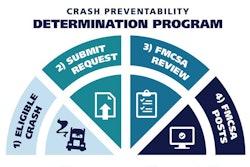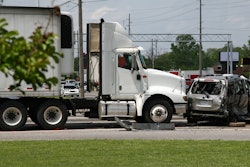With the election finally behind us and President-elect Donald Trump’s cabinet taking shape, the trucking industry is beginning to look ahead at what Trump’s second term will look like.
As we highlighted in the September 19 episode of the 10-44, a second Trump administration likely means a change in direction of the regulatory agenda when it comes to trucking. A number of issues are on the industry’s radar for possible change, including independent contractor classification, emissions regulations and much more.
Dave Heller, Senior VP of Safety and Government Affairs with the Truckload Carriers Association, joins us this week to talk about what he expects, and hopes, to see in the next four years.
Contents of this video
00:00 10-44 intro
00:28 Trucking and a 2nd Trump administration
00:59 Issues in trucking
01:42 Highway funding reauthorization bill
02:53 Independent contractor classification
04:42 Zero emission technology and mandates
07:32 Truck parking
09:22 Speed limiter mandate
11:09 Size and weight regulation
11:55 Hair testing for drugs and alcohol
12:43 Federal excise tax
Jason Cannon:
CCJ's 10-44 is brought to you by Chevron Delo, heavy duty diesel engine oil. Now there's even more reasons to choose Delo.
Matt Cole:
The election is finally over. What will a second Trump administration mean for trucking?
Jason Cannon:
You're watching CCJ's 10-44, a weekly episode that brings you the latest trucking industry news and updates from the editors of CCJ. Don't forget to subscribe and hit the bell for notifications so you'll never miss an installment of 10-44.
Hey everybody, welcome back. I'm Jason Cannon and my co-host is Matt Cole. With the election finally behind us and President-elect Donald Trump's cabinet Finally taking shape. The trucking industry has started to look ahead at what President Trump's second term will look like.
Matt Cole:
As we highlighted in the September 19th episode of the 10 44 a second Trump administration likely means a change in direction of the regulatory agenda. When it comes to trucking, a number of issues are on the industry's radar for possible change, including independent contractor classification, emissions regulations, and much more.
Dave Heller:
I think it goes without saying that regardless of the election results, and while we do pay attention to them as an association, our policies are dictated by our membership and that doesn't change, right? Our positions don't change. The issues are still the issues, and we will still be very active on the advocacy front, whether it's talking to the administration, talking about the House and Senate representatives and going from there and making sure issues like truck parking, the independent contractor hair testing for drugs and alcohol still are relevant and pertinent in today's conversation. So I think that goes without saying. So we certainly look forward to working with the administration. We look forward to working with both the House and Senate and making sure that our priorities are still reflective in our conversations
Jason Cannon:
With Trump's nomination of Sean Duffy. To lead the DOT in mind, Dave said a looming highway funding reauthorization bill will be a major undertaking in the next couple of years.
Dave Heller:
We have a lot of members that have worked with him in the past, specifically from the state of Wisconsin and look forward to working him again in the future if he is confirmed through the Senate confirmation process. I think he's very open to ideas. He's very receptive to conversation on the issues that reflect the industry, and it goes without saying. I think he recognizes that the trucking industry in of itself is the backbone of the US economy. In a role like that, understanding that basic principle certainly goes a long way. He's been involved in infrastructure projects before and in his role as secretary, he'll be involved in them. Again, there's a lot of things that need to happen within the next two years in Congress such as writing the next highway reauthorization bill because the IJA will be expiring in September of 2026. So the incoming Congress as well as President Trump, along with Secretary Duffy, will be tasked with actually getting and vetting out what that new infrastructure bill's going to look like and we'll make sure that our priorities are reflective of that and that we meet the needs of our membership when it comes to that
Matt Cole:
Independent contractor classification has been a hot topic in trucking for a number of years, and carriers have had to deal with multiple sets of guidelines dating back to the end of Trump's first administration. Dave said he believes that's one area Trump will again focus on.
Dave Heller:
It goes without saying. If you look at your large truckload carriers that operate on the road today, they started with this independent contractor business model, meaning they went out and bought one truck and delivered freight with that one truck and grew it from there. So we're firm believers in that American dream supporting that American dream of starting your own business, being your own boss, and building it into whether it's a massive truckload carrier or making decisions to build it to the size you want. But that business and the model should not be jeopardized, and our expectation with the Trump administration is that he will go back to the thought process he had when he was in office before supporting that business model, making sure that business model has the opportunity to thrive, and that's what we expect and look forward to, and that becomes that question is certainly you want to hope for stability in that rule rather than the back and forth and you want to support the business model because it's been very rewarding for those that have been in there.
I think the success stories are more prevalent than the bad stories about that, and we need to acknowledge the success stories and talk about how it's been a pillar of the trucking industry since the industry began. In saying that our expectation is that it continues moving forward, making sure that that process and that business model is stable in its interaction in the trucking industry because there is a need for these drivers. It's a need for these independent businessmen and women and going down that road that they can form their own businesses. If there wasn't a need for them, they wouldn't be employed today. But our industry is so fast and so flexible that there is a need for the independent contractor, and that need is still much alive today as it was 30, 50, 80 years ago.
Jason Cannon:
The Biden administration has pushed strongly towards zero emission technologies, particularly electric vehicles. Now, the trucking industry has made clear it's not against improving the environment, but it generally wants realistic timelines to achieve those goals. Dave explains what he expects from the Trump administration after a word from 10 44 sponsor Chevron lubricants.
Speaker 4:
We serve customers from Birmingham, Alabama to the Gulf Coast, so our people and our trucks are booked solid all day. There is no slack in our schedules. These trucks can't break down. I choose an engine oil that takes care of the number one issue with our engines emissions, so we don't have to worry about the DPF clotting. I choose the engine oil that keeps our trucks hauling. I choose DELO 600 A DF.
Dave Heller:
I think it goes without saying that nobody out there is against environmental improvements. I think we certainly want to leave the planet in a better situation than it is in when we got it. So in saying that and the trucking industry is no difference. In fact, our history suggests we're very for improving environmental aspects of the industry. The reality is we have to be strategic in rolling these things out. It can't just be here's the deadline when there are so many questions surrounding affordability, reliability, and achievability of those deadlines that there just aren't answers to yet. So in saying that, why would we have deadlines submitted to a rule, whether it's through California, through EPA, that just make no sense at this time and manner? I mean, the more time we talk about this, the more questions arise. So there has to be answers to these questions before these deadlines are set in place.
That ball is already rolling, and certainly we want to be partners in this program, but that partnership has to be strategic in nature and the deadlines that are put out there have to be ones in which certainly can be achievable. And right now it's just not the case. So we want to focus on getting equipment that actually works as affordable, reliable, and can meet those achievable deadlines. But right now is just not the case. So we want to engage in those conversations and certainly focus on the fact that we as an industry can get equipment that is comparable to the diesel powered engine. We can't disrupt the American economy and the freight delivery model that every person in this country relies upon on a daily basis. And if we move forward with what these deadlines are, there's that distinct possibility that that could actually really happen. So certainly the conversations have to unfold and we have to be strategic in those conversations to make sure that they know the issues that are affecting this industry if we move forward with the current deadlines and that becomes the case. So I think the reality is going to be is there's pipe dreams and then there's reality, and I think the reality certainly will prevail.
Matt Cole:
Another area that TCA tends to focus on with the new administration and Congress is truck parking expansion. A top issue among truck drivers legislation has been introduced to provide funding specifically for truck parking, but it is yet to cross the finish line.
Dave Heller:
It was left out of the IIJA truck parking in saying that it seemed to be a massive omission by being left out, especially because truck parking, I think by actually at this point, the drivers, it's the number one issue for drivers out there at this point in time. So whether it is that $755 million for truck parking, the truck parking Safety Improvement Act, or there was actually $200 million that was noted in the approach process in the house that didn't get voted up because they went to a cr. The reality is this Congress is taking note of this problem and this omission and needs to fix it. So they have to include this and it's dedicated dollars strictly towards truck parking, which means they can't take this money and put it towards a bridge or take this money and put it towards a road. It's money that can go directly towards truck parking and give our professional driving force the amenities they need while they're on the road or the ability to stop and get restorative sleep in a safe and secure manner.
And this is what it's really designed to do. So it eliminates that number one priority of those drivers. They can stop thinking about that and actually still focus on delivering freight rather than worrying about where they're going to park for the night. So those dollars are very much needed. The problem has been highlighted time and time again. I think we continue to pound that drum on Capitol Hill to the point where I don't think there's somebody that looks at us and say this is not needed. I think the reality is they all believe it is needed, and our expectation is there will be some funding, whether it's that 7 55, that 200 million that was in the approach process in the house, some funding attributed to improving this process all across the country. It just has to be there. There's no doubt about it. We can't turn our back on this issue anymore.
Jason Cannon:
The first time Trump was in office, FMCSA kicked the can on a speed limiter mandate that was in the works in almost a deja vu scenario. F-M-C-S-A under Biden has also been working on a potential speed limit or proposal. Will it get shelved again under Trump?
Dave Heller:
It's an interesting one, right, in terms of speculating of where this rule goes, but the results are there on the rule, and it's no secret that TCA is supportive of a speed limit or rulemaking. If you look at the results in Ontario and Canada that put their speed limiter rule in place in 2008, since then they've had a 73% reduction in speed related accidents. That's not a thing that says, oh, maybe it works, maybe it doesn't. 73% reduction are real numbers in reducing speed related accidents, and that continues to be, well, one of the top two causes of accidents out on our roads today, speed related accidents or distracted driving. So the reality is we have to get this into some perspective, and what we have seen is that carriers out on the road today have put speed limiter practices within their fleets. Innovators are going to beat regulators six days a week and twice on Sundays almost every time.
So this is that opportunity for others to catch up to what our innovative fleets are doing out in the marketplace today. So in saying that we have to get these speed related accidents under control, it goes without saying that the goal of everybody is to avoid accidents and prevent accidents on our roadways. This would be one of those things to actually do. So. Now, in saying that, we'd like to see what the rule actually says because that's one of the things that nobody knows what speeds the agency is going to look to limit trucks at. So we continue to question what the rule is going to say and where it goes from here. So until we really know what that rule can say through a supplemental notice of proposed rulemaking that the agency's going to do, and we'll see how we weigh in on that.
Matt Cole:
Dave said, size and weight regulations, hair testing for drugs and alcohol and more are other areas he expects to come up for debate in the coming years.
Dave Heller:
Size and weight is always going to be that conversation, right? When you talk about productivity of drivers, and there are other ways we can gain productivity of drivers rather than just increasing size or weight and TCA supports keeping size and weight restrictions as they are right now. We don't support twin 33 foot trailers. We don't support increasing weight. So I think we will be engaging in those conversations. The conversations will happen again as they always do, and we will continue to maintain our position on what it is. So I think it goes without saying is whenever there's a change either in the House or Senate or even in the White House, the conversations are going to come up and we'll maintain our and continue to advocate for that position. I think we also have to look at things like hair testing for drugs and alcohol.
This was originally in the 2015 Fast Act. Yet here we are looking at what the next highway reauthorization is going to be, and we still don't have rules and regulations that would allow for hair testing as an alternative measure for detecting drug use on their driving population. We've had carriers that have tremendous amount of success with these types of programs and eliminating it from their driver pool, but they can't put those results into the clearing house. So that's problem number one and two and three and four, no matter how you look at it when it comes to combating drugs on our highway. So we applaud the effects and what has happened with the clearinghouse and continue to support it, but we can do better and should be doing better, and we should be incorporating hair testing as an alternative measure to drug testing our drivers out there.
I think we also have to look at the federal excise tax. There's no doubt about it. The FET has been around to support World War I efforts, and that war has been fought. The victors had been decided we had a second World War, we've had other conflicts since then. You're talking about a century old tax that was put in place to support the war effort. But it exists still today, and this is not a small chunk of change. I mean this 12% on the purchase of new equipment in terms of tractors and trailers. So that does equate to a lot of dollars out there, and we get it. We understand that those dollars go directly to the Highway Trust Fund, but the reality is, is those shortcomings with the Highway Trust Fund are not new, and they're made up through for general fund transfers. So do we really need an FET tax that is going to stymie purchases of new equipment out there that would better the safety record of the industry? Or should we continue paying an FET tax that is outdated and that will discourage investment in new equipment? So that becomes the question. So we certainly have to have those conversations on that as well.
Jason Cannon:
That's it for this week's 10-44. You can read more on ccj digital.com. While you're there, sign up for our newsletter and stay up to date on the latest in trucking industry news and trends. If you have any questions or feedback, please let us know in the comments below. Don't forget to subscribe and hit the bell for notifications so you can catch us again next week.










